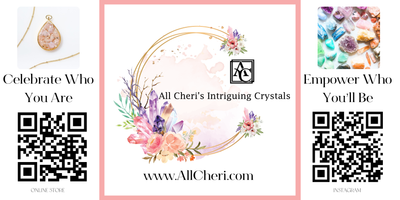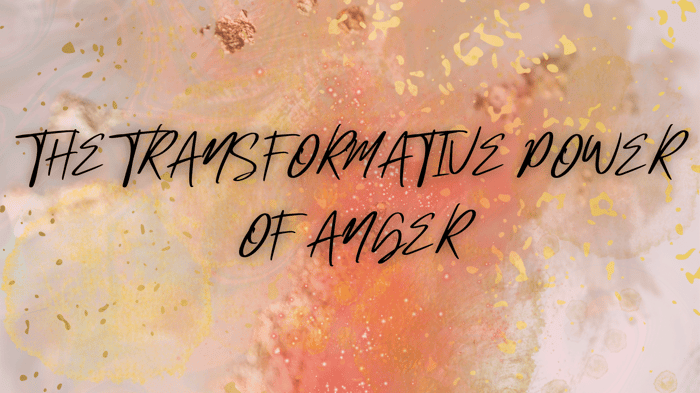Let's talk about emotions, particularly anger, which is the one we're often told to suppress, avoid, or mask with a polite smile. But what if anger wasn't something to fear, hide, or ignore? What if it was a signpost pointing us toward deeper truths about ourselves and the world? Lately, I've been sitting with my anger—those unmistakable "WTF" moments mixed with disappointment and frustration. It's been uncomfortable and also eye-opening.
As someone who has spent most of my adult life advocating for workers' rights, healthcare access, and equity, I've seen firsthand how anger can ignite action. Lately, however, the weight of injustices in the world and the feelings of impending chaos have left me feeling raw. I'm still deeply committed to sharing about self-care, crystals, and intentional living, but I'm also learning that embracing anger—rather than running from it—can be an essential part of growth and transformation.
I haven't figured it all out. I'm a work in progress, still learning how to sit with discomfort without getting stuck in it or letting it grow to unhealthy, explosive points. But I want to share what I've been discovering because maybe you're navigating these emotions, too. Let's explore how anger can be a tool for good when we stop treating it as the villain.
The Purpose of Anger: It's Not Just Rage
At its core, anger is information. It's not inherently bad or dangerous—it's a signal. When processed constructively, anger can be one of the most transformative emotions we experience.
- Self-Protection: Anger alerts us when our boundaries are crossed, reminding us to defend our emotional and physical well-being.
- Catalyst for Change: It can ignite courage and push us to speak out against injustice, help others, and protect our values and sense of self. Some of the most profound societal shifts have been fueled by anger.
- Emotional Clarity: Anger often reveals deeper emotions like fear, grief, or unmet needs. When we pause to explore those layers, we gain self-awareness. We learn more about our boundaries, pain points, and the impacts of our experiences.
- Motivation: When harnessed thoughtfully, anger can fuel personal growth, breaking patterns of complacency and inspiring action. It can be the spark that gives us the confidence to see the light in a space of darkness.
Anger, like fire, can either destroy or illuminate. The goal isn't to extinguish it but to learn how to keep it from burning out of control.
Why Anger Feels So Uncomfortable
Let's be honest—anger can feel messy. For many of us, it's an emotion we've been conditioned to suppress. We're told it's "unprofessional," "unattractive," or "too much." But the truth is, anger feels uncomfortable because it challenges our sense of control.
Anger often bubbles up when my core values—like fairness and respect—are violated. The injustice I witness, especially in my advocacy work, strikes a nerve that's hard to ignore. But instead of stuffing it down or letting it consume me, I'm learning to ask:
- What boundary feels crossed?
- What is this emotion trying to tell me?
- How can I express it without losing myself and giving myself permission to explore?
When we sit with these questions, we see anger not as chaos but as clarity.
The Fine Line: Destructive vs. Empowering Anger
Unchecked anger can spiral into lashing out, resentment, and lingering negativity. I, too, have experienced it as both the receiver and the giver. But when acknowledged and expressed mindfully, it can be incredibly empowering.
Think of anger as a surge of energy. You can let it consume you or learn to channel it productively. Here's how I'm working to keep it healthy:
- Acknowledge It: Pretending anger doesn't exist only bottles it up. Naming the emotion is the first step in reclaiming control.
- Identify the Trigger: Is it a crossed boundary? Unmet expectation? Fear? Understanding the source helps you respond with clarity.
- Express It Without Blame: "I feel hurt when…" instead of "You made me angry…" shifts the conversation from confrontation to understanding.
- Move the Energy: Ever feel your body tighten when you're angry? Movement helps release that energy. Go for a nature walk, dance to your favorite playlist, and, if possible, find a place for a good scream. Yes, I do that and drop multiple F-bombs as needed. And yes, it helps.
- Take Positive Action: Channel your anger into something meaningful—advocacy, creative expression, connecting to communities who feel your frustrations, or simply standing up for yourself.
Anger is only destructive when left unchecked. When held with care, it can be a powerful force for growth.
Crystals to Support Emotional Balance
If you're like me, you might find comfort in tangible tools during emotional processing. Crystals can be incredible companions for navigating and balancing anger. Here are three I've found supportive to use when meditating or as a fidget in my hand when processing.
- Lepidolite – Known for its soothing energy, it contains lithium, which is believed to calm emotional storms and ease tension. I mainly keep it in my pocket or wear it for moments when anger feels overwhelming.
- Black Obsidian – Known as a stabilizing stone, Black Obsidian is said to absorb negativity and clear emotional clutter. It's ideal when you need to clarify difficult emotions and maybe get a little uncomfortable.
- Smoky Quartz – Perfect to wear or have near when you are ready to transmute negative energy into positive action. Smoky quartz is considered the stone that reminds you to release what no longer serves you while staying grounded.
Affirmations for Processing Anger
Pairing affirmations with mindful practices can be incredibly effective for shifting your emotional state. Here are two I've been using during moments of frustration:
- I honor my anger as a messenger and trust it will guide me to clarity.
- I can feel anger without being consumed by it. I choose peace, self-protection, hard boundaries, and action.
Reflective Questions for Sitting with Anger
I know how easy it is to avoid anger—to brush it off or stuff it down. What if you gave yourself permission to explore it instead? Here are some journal prompts to help you sit with your emotions:
- What is my anger revealing about my values?
- Am I avoiding this emotion, and if so, why?
- How can I express this feeling in a way that feels empowering, not destructive?
- What small action can I take today to honor what my anger is teaching me?
Final Thoughts: You Don't Have to Have It All Figured Out
Here's what I'm still learning: it's OK to be a work in progress, to feel messy emotions, and not have all the answers. Anger isn't something to fear—it's something to understand. When we slow down, sit with it, and let it speak, anger can transform into clarity, courage, and positive change.
I'm still figuring this out, just like you. And the truth? It's messy and uncomfortable and can sometimes make me angry about being angry. But the more I allow myself to feel, process, and explore, the lighter and more empowered I feel. So let's give ourselves permission to grow—one breath, one moment, one music/dance/scream session at a time.
You've got this. And I'm right here, figuring it out alongside you.
Additional resources for further reading:
GoodTherapy. "The Value of Anger: 16 Reasons It’s Good to Get Angry." GoodTherapy Blog, March 13, 2017, https://www.goodtherapy.org/blog/value-of-anger-16-reasons-its-good-to-get-angry-0313175.
Raypole, Crystal. "Why Being Angry Is Okay (and Even Helpful)." Psychology Today, July 7, 2020, https://www.psychologytoday.com/us/blog/the-savvy-psychologist/202007/why-being-angry-is-okay-and-even-helpful.
Smith, Peg. "When Anger Is a Good Thing." Psychology Today, September 2024, https://www.psychologytoday.com/us/blog/the-main-ingredient/202409/when-anger-is-a-good-thing.
Aubrey, Allison. "Feeling Ragey? Don't Bury Your Anger, Process It. Here's How." NPR, March 12, 2024, https://www.npr.org/sections/health-shots/2024/03/12/1236973762/anger-management-types-purpose-cause.
Freeman, Hadley. "Anger Is an Energy: How to Turn Fury into a Force for Good." The Guardian, May 13, 2019, https://www.theguardian.com/lifeandstyle/2019/may/13/anger-interviews.

